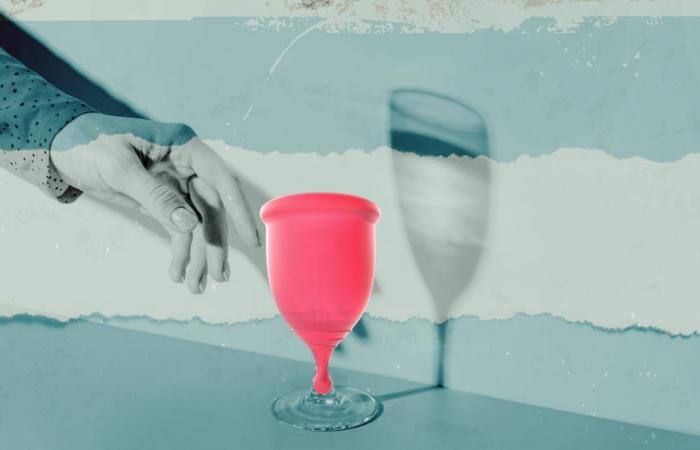With detours and a lot of shame, Yadira has asked a menstrual cup to his childhood friend Doris, who lives in Spain. “I can’t take it anymore, The intimate thing in pharmacies is a disaster; When it is not months without receiving them, it is the suffering due to poor quality. They can’t stand the abundance of my period, I spend the seven days of the month that I have in terrible discomfort, staining clothes and with a disgust that I shouldn’t feel for something that is inherent to the female condition. “My gynecologist recommended the cup, but I don’t know how to get it here.”
The situation of this young Cuban woman with menstrual hygiene It is the same as that of thousands of other women on the Island conditioned by the shortage of sanitary pads and other products to contain bleeding, the prohibitive prices of the offers, and the lack of work and student facilities, among others, with minimum conditions to receive menstruating women. They are another reality that deepens gender inequality.
On May 28, the International Menstrual Hygiene Daya date that aims to raise awareness and raise awareness among the population about this human rights issue. That same day, María Regla purchased through Revolico, for a price of 500 pesos, two packages of Angélica brand pads, which the Italian-Cuban company Industria Arthis began to manufacture in December 2023.
“This time I was lucky, last month I bought them for 850. These are the best quality and I leave them with the girl (a 14-year-old teenager). I usually have less bleeding and I manage with the intimate ones from the pharmacy that, by the way, where my sister lives they have delays of months,” he told DIARIO DE CUBA.
Inside the Island the situation is critical. In a recent report, the provincial newspaper of Ciego de Ávila, Invader, reported that, so far this year, intimates have not been sold in the territory’s pharmacy network, a situation that is repeated in almost all Cuban provinces. In Santiago de Cuba since February 2023 they have not distributed them. There, a university professor has had to resort to torn towels, old blouses and unused school socks to contain the bleeding of two teenagers, who “have had to use unsanitary rags since they had their first period.”
In that province, packages of 20 units cost 800 pesos, those of 36 can be found for 1,500, and boxes of 50 tampons cost between 1,000 and 1,200 pesos. In foreign currency, the amount ranges between 4.50 and 5MLC.
In 2021, the Nuevo País Women’s Platform presented the report Menstruation and Human Rights in Cuba in which he made an outline of the situation and recommendations to the State.
Eroises González, national coordinator of the group, told DIARIO DE CUBA that “the outlook remains critical, nothing has changed.” She considered that “It is not an issue that worries the organizations (State or controlled by it) that have to do with the issue of women, girls and adolescents.“.
“Exist problems with hygienic-sanitary facilities and there is no access to convenient menstrual hygiene, so Cuban women are exposed to more health risks“he noted.
González recalled that girls and adolescents sometimes miss school for fear of staining when they are on their period and because of pain that makes them unable to carry out all types of activities. “This limits their studies and there is a risk of dropping out of the school system. The shortage of hygienic-sanitary materials, medicines and minimum conditions widens gender inequality“, he pointed.
The platform claims that menstrual hygiene is on the state agenda as a priority. “There has been no work to legislate, to develop public policies on the subject that guarantee access to menstrual hygiene and hygiene products for all girls, adolescents and women, including those with disabilities, in situations of mobility or deprivation of liberty” .
If for Cuban women in freedom the arrival of their menstrual period is a “moment of sadness”, for imprisoned women it is a “horror”said Annia Zamora, mother of 11J political prisoner Sissi Abascal.
“Not only is it the high price that many cannot pay, but there is none,” said Zamora, a resident of Carlos Rojas, Jovellanos municipality, Matanzas. The activist described the situation of her daughter in prison as “worrying.”
“From time to time they give him a small package of those pads that are of very poor quality. I always have to buy him and bring him. For me too the water issue is very worrying. I bring him the one to drink because the water there is contaminated. We have taken the measure of bringing him baking soda to put in his washing water because I am terrified that he will catch a parasite there. “There is no medicine here, neither on the street nor in hospitals, much less in prison,” she lamented.
For feminist activist Kiana Anandra, Menstrual hygiene in Cuba is “regrettable.” For her, the situation is marked by three major problems that extend to all public services in Cuba: “accessibility, quality and price.”
“Getting menstrual hygiene products is a difficult task. Those that are quality are mostly sold in freely convertible currency (MLC), in stores with foreign currency, stores located in hotels and international pharmacies,” he noted.
He regretted that “the state pharmacy, which ideally should be the distributor of this type of products, at affordable prices (1.20 pesos), always has delay problems.”
The only company that manufactures the Mariposa brand pads is the state-owned Sanitary Hygienic Materials (MATHISA), with offices in Havana, Sancti Spíritus and Granma. Its production is plagued with problems, mainly because eight of the ten inputs necessary for manufacturing are imported and the Government blames the embargo for hindering their purchase.
“I belong to the Plaza municipality, to the Carmelo council, and this year it has not arrived yet. Last year it came in two rounds, but all that time in between menstruating people must resolve as best they can,” said Kiana Anandra.
“Menstrual hygiene is intimate hygiene, the tampon, the cup, but it is also anti-inflammatory for pain, birth control pills, water and other sanitation products. All factors that become even more complex when the menstruating person also decides to be a mother,” she said.
A gynecologist consulted by DIARIO DE CUBA who preferred to speak anonymously warned that Menstruation often prevents women from participating in ordinary activities and this requires medical attention.
“There are times in which the pain can be debilitating. This is the case of dysmenorrhea or menstrual cramps. To this we must add other ailments linked to menstruation and that must be treated such as menorrhagia or prolonged bleeding, with the risk of anemia , polycystic ovary syndrome, endometriosis or fibroids. Having pain with your period is common, but it is not normal, and this intense pain must be treated,” she clarified.
The doctor warned that poor feminine intimate hygiene can create conditions for pathogenic microorganisms such as candida to grow.
“Although it is not advisable to subject the genital area to continuous washing with soaps not designed to respect the vaginal flora, the lack of cleanliness, contaminated water and rags that people without resources resort to (the UN and UNICEF speak of menstrual poverty ) can cause infections, some of which can have a negative impact on fertility, for example.”






